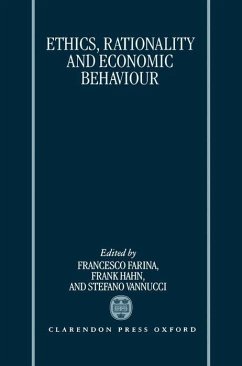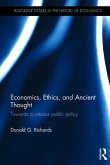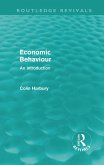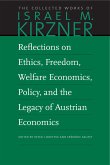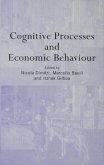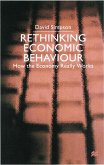The essays included in the present volume provide a detailed analysis of the connections between ethics and economics as viewed from several different - sometimes conflicting - perspectives. This book, the outcome of a joint meeting of philosophers and economists, has three main themes: the validity of utilitarianism much used by economists, the notion of fairness and equity, and the coherence of the rationality postulate of economics. The book does not reach any final conclusions, but it greatly illuminates the exact areas of possible disagreement and indeed the open-ended nature of ethical reasoning. There is much that economists, and especially welfare economists, can learn from these papers - not least circumspection.
The connection between economics and ethics is as old as economics itself, and central to both disciplines. It is an issue that has recently attracted much interest from economists and philosophers. The connection is, in part, a result of the desire of economists to make policy prescriptions, which clearly require some normative criteria. More deeply, much economic theory is founded on the assumption of utility maximization, thereby creating an immediate connection between the foundations of economics and the philosophical literature on utilitarianism and reasons for action. In fact, some influential contemporary approaches to ethics advocate decision-theoretic or game-theoretic foundations of some sort for moral principles, while several economic theorists are now prepared to take into account the ethical dimensions of rational decisions. As a result, it appears that economics and ethics are somehow inextricably linked through theories of rational decision-making. This book, the outcome of a joint workshop of economists and philosophers, offers an overview of the current academic debate on the connections between economics and ethics, ranging through three main themes: the moral standing of utilitarianism, the notion of fairness and equity and its formal treatment, and the coherence and scope of the rationality postulate underlying standard models of economic behaviour. In particular, the essays included in the volume provide a detailed analysis of disclosed contradictions and possible convergences between the prescriptions of rationality and the requirements of moral 'rightness', as viewed from several different, sometimes conflicting, perspectives. While the book points mainly to theneed for a more rigorous appraisal of the moral underpinnings of economic discourse, it also highlights the open-ended nature of ethical reasoning. There is much that economists, and especially welfare economists, can learn from these papers - not least circumspection.
The connection between economics and ethics is as old as economics itself, and central to both disciplines. It is an issue that has recently attracted much interest from economists and philosophers. The connection is, in part, a result of the desire of economists to make policy prescriptions, which clearly require some normative criteria. More deeply, much economic theory is founded on the assumption of utility maximization, thereby creating an immediate connection between the foundations of economics and the philosophical literature on utilitarianism and reasons for action. In fact, some influential contemporary approaches to ethics advocate decision-theoretic or game-theoretic foundations of some sort for moral principles, while several economic theorists are now prepared to take into account the ethical dimensions of rational decisions. As a result, it appears that economics and ethics are somehow inextricably linked through theories of rational decision-making. This book, the outcome of a joint workshop of economists and philosophers, offers an overview of the current academic debate on the connections between economics and ethics, ranging through three main themes: the moral standing of utilitarianism, the notion of fairness and equity and its formal treatment, and the coherence and scope of the rationality postulate underlying standard models of economic behaviour. In particular, the essays included in the volume provide a detailed analysis of disclosed contradictions and possible convergences between the prescriptions of rationality and the requirements of moral 'rightness', as viewed from several different, sometimes conflicting, perspectives. While the book points mainly to theneed for a more rigorous appraisal of the moral underpinnings of economic discourse, it also highlights the open-ended nature of ethical reasoning. There is much that economists, and especially welfare economists, can learn from these papers - not least circumspection.

